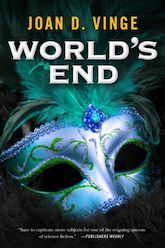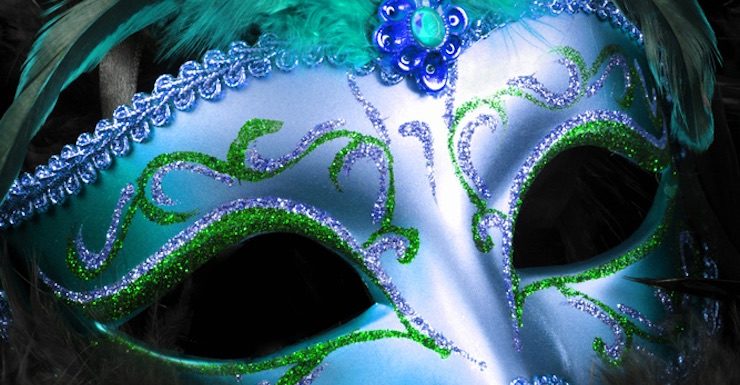If there is one thing I’ve learned from science fiction, it is “never go camping.” In real life, the worst I’ve had happen to me while camping is minor stuff:
- whomped by a falling tree;
- close encounters with moose1;
- crushed two fingers playing cards;
- that whole thing with the two dead popes.
In SF, camping trips generally foreshadow near-total party kills or worse. Which brings me to Joan D. Vinge’s World’s End, the second volume in her Snow Queen sequence, newly reissued by Tor this month.
Romantic hypotenuse BZ Gundhalinu flees the world of Tiamat and the woman he lost and heads for the dreary but resource-rich planet Number Four. Distance and time might help him forget Moon Dawntreader Summer. It will certainly give him ample opportunity for self-loathing; BZ is extremely judgmental, and the person who is most often the subject of his unforgiving gaze is BZ himself.
Buy the Book


World’s End: An Epic Novel of the Snow Queen Cycle
BZ’s older brothers SB and HK are not as handicapped by self-doubt as is BZ. Both SB and HK are overconfident idiots (but in distinctive ways, mind you). Bold investments have freed the brothers from the constraints of fortune, social position, and an estate that had been in the family for a thousand years. Obviously, these investments were more bold than wise.
It’s possible for enthusiastic amateurs to win a quick fortune on Number Four, which is what brings the newly impoverished brothers to the same backwater world as BZ. Poor BZ! He knows that his brothers are more likely to lose their lives than to win fortunes out in the wilderness, so poor, morose, dutiful BZ heads out into the wilds in search of his two feckless brothers.
The climate, flora, and fauna of Number Four are nasty challenges in themselves, but BZ finds himself dealing with his unreliable companions, bandits, a mad priestess, and something that is terribly like a living god…
World’s End forms part of the Snow Queen series, but it works as a standalone. All necessary clues to character and setting will be found in the book. As this is true for all three of the Snow Queen books that I have read, perhaps it is true of the one I have not read2. This doesn’t seem like something that should be so unusual as to warrant acknowledgement … and yet somehow it is.
BZ’s problem is that he takes his Kharemoughi ideals very very seriously. Kharemough is a technocratic re-imagining of an American’s idea of India’s caste system, a manifestly unjust system made that much worse by having smugly over-confident hereditary engineers in charge. The claim is that the Tech are the smartest, and therefore the best people to have running things. In reality, they’re no wiser than any other aristocracy; the ideals are only there to justify their monopoly on power. Poor BZ lacks the art of willful blindness and is too proud to be hypocritical. Enormously inflexible, he was broken in The Snow Queen by the difference between what his principles demanded of him and what reality permitted. I’d like to say it gets better for him in this book—but there would be no plot if it did.
From BZ’s perspective, the humiliation conga to which he was subjected in The Snow Queen was only one more misery in a life filled with misery. BZ has spent his life so far losing out to obviously less capable people and blaming himself for the result. If he’d only been perfect, he could have found a way to square the circle.
One could say that Vinge’s Snow Queen books are about people who, through heroic effort, win the wrong prizes. In The Snow Queen, Moon manages to win Sparks because she thinks of him as her childhood sweetheart and not as the jerk he really is. In World’s End, what BZ actually needs is therapy; what he gets is the chance to make decisions that will affect the lives of billions of people (which is very much what you don’t need if you are morbidly conscientious and self-lacerating). In The Summer Queen … well, that would be telling.
Vinge’s Snow Queen series is available from Tor Books. The Snow Queen and World’s End have recently been reissued in paperback, while The Summer Queen and Tangled Up in Blue are available as ebooks.
1: For those of you fortunate enough to live somewhere without moose: they’re big, they’re of uncertain temperament, and they can be as silent as a shadow when they want to be. It’s quite possible to look up from reading The Princess Bride to find that a moose mom and her calf are foraging ten meters away, confident in their ability to reduce any given human to paste if necessary. My mother had a funny story about that time she went out on a date and her escort decided to clear an irritable moose off the highway by leaning on the horn of his (borrowed) car. The story ends with the car reduced to scrap, my mother walking home, and no second date.
2: Why haven’t I read the fourth book in the series, Tangled Up in Blue? Same reason I almost never finish a given bag of chips: if I read the final book in the series, I’m never again be able to first-read a book in that series. As long as I don’t eat the chip/read the book, the last bit of pleasure is held in reserve. There are a number of series I am refusing to finish. (Plus some stale chips in the cupboard.) In my brain, this makes sense. Of course, sometimes I plunge ahead wildly, determined to have it all as fast as possible. Why some series evoke this and others do not is a mystery.
In the words of Wikipedia editor TexasAndroid, prolific book reviewer and perennial Darwin Award nominee James Davis Nicoll is of “questionable notability.” His work has appeared in Publishers Weekly and Romantic Times as well as on his own websites, James Nicoll Reviewsand Young People Read Old SFF (where he is assisted by editor Karen Lofstrom and web person Adrienne L. Travis). He is surprisingly flammable.










